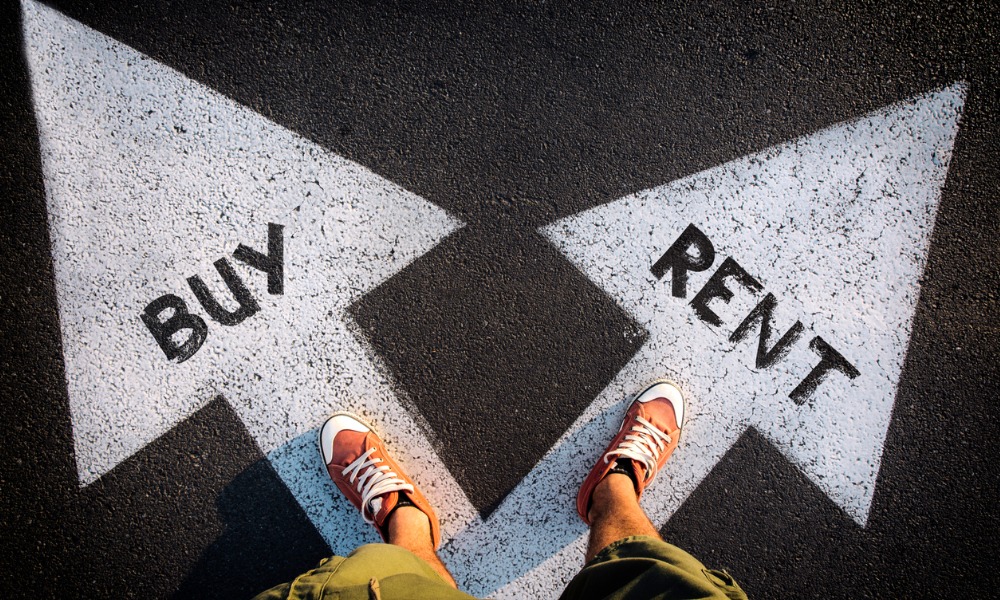Deciding whether renting is better than buying involves a lot of factors to consider. In this article, we’ll discuss them and help Americans make the right choice

Updated May 29, 2024
Many people view property ownership as the first step to financial stability. For young Americans, looking for property to buy and turn into a home is a transition to adulthood. On the other hand, renting is seen as the easier option since the payment terms are cheaper. A large sum of money for a deposit is often unnecessary in renting. This makes it the more viable choice for those who are starting to build their career and wealth.
Still, is renting better than buying? This has been the topic of an ongoing debate among real estate and mortgage professionals, property investors, and other stakeholders over a lengthy stretch of time.
In this article, Mortgage Professional will give insights about this core issue and help you understand the advantages and disadvantages of both options. Do you have clients who are unsure if they want to rent or buy a home? Share this with them!
Is renting better than buying a property in the US?
This matter cannot be answered in a simple yes or no without looking at varying elements. Our initial approach must be in an economic perspective to help Americans decide if they want to rent or own a house:
Buying makes more financial sense than renting
As the purchase market heats up and buying a house gets more competitive, many borrowers may be asking why they are going through the stress, anxiety and headaches of the homebuying process. Single family rental developments have taken off, and it might be easier or even more financially sensible to rent in the suburbs rather than buy.
While the emotional resonance of property ownership and the American Dream are certainly compelling, sometimes home buyers need to make the brass tacks case that buying a home makes more financial sense than renting.
To see if such a case might be made, Odeta Kushi looked at 50 housing markets across the US. The deputy chief economist at First American Financial Corporation did this to see if renting or buying made more financial sense. In all but two of those markets—San Jose and San Francisco—owning made more sense than renting.
Even in locations where house price appreciation meant the monthly cost of ownership was slightly higher than renting, a key element of ownership made it the better financial option: equity appreciation.

Odeta Kushi from First American Financial Corporation, led a study of 50 housing markets in the US to find out if renting is better than buying.
“We started this study looking at median monthly mortgage payments in our top 50 markets compared to the median rent. When we did that, we found it was cheaper to rent rather than own in 32 markets,” Kushi said.
She then commented on the discrepancies between buying and renting: “But when we did that, we thought, wait, owning is very different from renting because you get the benefit of equity, the benefit of house price appreciation.”
“When we accounted for house price appreciation in that monthly cost of owning, we found that it was more financially prudent to own rather than rent in 48 out of the top 50 markets in the USA,” Kushi added.
While the two outliers were both in extremely expensive markets around Silicon Valley, Kushi explained that Phoenix, Arizona, was the market where it made the most sense to own rather than rent.
House price appreciation means creating wealth overtime
While Kushi accepts a future rise in mortgage rates could cool off some of the demand currently driving the pace of house price appreciation, she also noted that house price appreciation tends to be “downside sticky.”
Sellers, she noted, would often rather withdraw from the market than sell at lower prices in the housing market, keeping supply tight and appreciation up. With rates and housing supply as low as they currently are, we can still count on broadly strong house price appreciation even if rates do tick up.
For mortgage professionals looking to communicate this information to prospective borrowers, Kushi offered a straightforward takeaway: the house is paying you. Borrowers buying in markets experiencing rapid house price appreciation can enjoy measurable growth over time.
Another study by First American found that housing is one of the biggest drivers of wealth creation in the United States. For a new borrower, especially a first-time borrower, buying a home with an eye to appreciation means buying into this wealth creation.
Kushi emphasized that this financial case for ownership needs to be folded into the wider lifestyle questions around why a borrower wants to buy a home. Mortgage professionals should offer this information as a value add, one that supports the borrower’s wider hopes and dreams.
“I think the takeaway from this study is that borrowers will also get the equity benefits from buying that home,” Kushi said. “But keep that in mind—they are making this lifestyle decision. It is something that that has been on the docket for a lot of millennials to do once they get married and have kids. They are making that [lifestyle] decision, but also, in a lot of these markets, they are gaining the equity and the wealth creation from that home.”
Homeownership, she said, “has really been essential to the American dream, largely because it is a vehicle for wealth creation. I think that that is something that mortgage professionals can use this study to show.”
Is being a homeowner still worth it in the US?
Practicality and sustainability should go hand in hand to know whether being a homeowner is still worth it in the US. Property hunters need to think clearly if homeownership is practical in terms of their financial capacity. It is also vital to weigh their options before deciding if they can sustain the mortgage. Let's discuss if owning a house is a practical choice for Americans:
Practicality
Once the client chooses a property to buy, they should have the money needed to make a deposit before applying for a mortgage. Aside from this, their income and overall financial situation will be analyzed by the mortgage lender before granting the loan.
These transactions can sometimes be a hassle, making renting sound more practical than owning a house. It does not come with the complications and requirements involved in property ownership.
However, practicality sets in with purchasing when it comes to long-term goals. The house will be entirely yours after completion of the mortgage repayment. In renting, the payment has to continue if the renter wants to keep living in the property.
Sustainability
If the client wants to purchase property, they must be able to sustain the mortgage. After the complicated process of buying property in the US, a homeowner will shift their focus on paying what they owe to the mortgage company within the given timeframe. This means that they are responsible for the mortgage payment, which consists of the principal and the interest of the loan taken out to buy the property.
In turn, buyers should consider their income and other sources of cash flow to evaluate if they can maintain their monthly dues until the mortgage is paid in full. If sustainability cannot be determined, then renting might be the better option.
Renting is not a waste of money - here’s why
The average rental fee paid monthly by a renter in the US is $1,979 according to Bankrate’s findings. The study also states that Americans, on average, pay a mortgage fee of $2,703 per month for a median-valued property amounting to $412,778. Obviously, it is cheaper to spend for rent than pay for mortgage.
Curious to know more about this topic? Watch this video that explain five instances when renting is more advantageous than owning a house in the US:
Is it smarter to rent or to buy?
Today’s Homeowner provides the top ten cities where it is more affordable to be a renter than a homeowner:
|
Rank |
City |
Total Cost of Owning |
Total Cost of Rent (30 years) |
Difference Between Renting for 30 years vs Owning |
Down Payment |
|
1 |
Irvine, California |
$3,380,897 |
$2,059,319 |
−$1,321,578 |
$94,500 |
|
2 |
Fremont, California |
$3,413,814 |
$2,213,767 |
−$1,200,047 |
$96,600 |
|
3 |
San Jose, California |
$3,420,113 |
$2,229,374 |
−$1,190,738 |
$96,250 |
|
4 |
San Francisco, California |
$3,317,345 |
$2,414,923 |
−$902,422 |
$92,610 |
|
5 |
Los Angeles, California |
$2,523,447 |
$1,848,268 |
−$675,179 |
$70,000 |
|
6 |
Long Beach, California |
$2,029,029 |
$1,416,371 |
−$612,657 |
$55,300 |
|
7 |
Arlington, Virginia |
$1,968,567 |
$1,388,185 |
−$580,382 |
$51,800 |
|
8 |
Madison, Wisconsin |
$1,188,339 |
$768,155 |
−$420,184 |
$28,000 |
|
9 |
Anaheim, California |
$2,122,069 |
$1,720,907 |
−$401,162 |
$58,450 |
|
10 |
Austin, Texas |
$1,626,126 |
$1,247,485 |
−$378,642 |
$39,970 |
In New York and other cities, however, homeowners have the upper hand. In 30 years, they will spend $2.1 million on average while renters will allocate $2.4 million for their rental fees. Here are other cities where buying a home is cheaper than renting:
|
Rank |
City |
Total Cost of Owning |
Total Cost of Rent |
Difference Between Renting for 30 years vs Owning |
Down Payment |
|
1 |
Nashville, Tennessee |
$1,245,503 |
$1,917,871 |
$672,369 |
$32,200 |
|
2 |
Chula Vista, California |
$1,993,324 |
$2,474,909 |
$481,585 |
$53,900 |
|
3 |
Miami, Florida |
$1,626,650 |
$2,059,606 |
$432,955 |
$40,600 |
|
4 |
Baltimore, Maryland |
$723,868 |
$1,144,127 |
$420,259 |
$15,400 |
|
5 |
New York City, New York |
$2,093,789 |
$2,483,133 |
$389,344 |
$56,070 |
|
6 |
Jersey City, New Jersey |
$1,853,594 |
$2,193,182 |
$339,588 |
$47,950 |
|
7 |
Tampa, Florida |
$1,203,436 |
$1,531,254 |
$327,818 |
$30,100 |
|
8 |
Cleveland, Ohio |
$448,720 |
$763,273 |
$314,553 |
$8,190 |
|
9 |
Detroit, Michigan |
$436,767 |
$738,003 |
$301,237 |
$5,950 |
|
10 |
St. Petersburg, Florida |
$1,121,868 |
$1,411,382 |
$289,514 |
$28,840 |
Making the decision: is renting better than buying?
The decision will always be based on the client’s specific financial situation and long-term goals. As seen above, making the choice requires careful consideration of a variety of factors.
In the US, there is no statewide answer that is correct. You can always look at the statistics and the charts, but these numerical figures do not include a renter’s or homeowner’s lifestyle preferences. This is the defining element in answering the question, “is renting better than buying?", since it really depends on every person’s unique way of living.
If you want to give sound advice to your clients, tell them to thoroughly explore the trade-offs and align their decision with how they want to live their lives. Guide them in learning about financial security, comparing homeownership to renting so they can achieve long-term fulfillment.
Discuss all the necessary details such as the ones above and other considerations that you might add. In this way, you can help them realize if they are better off as renters or if they will find joy as homeowners.
In your view, is renting better than buying? Or is it the other way around? Leave a comment below



